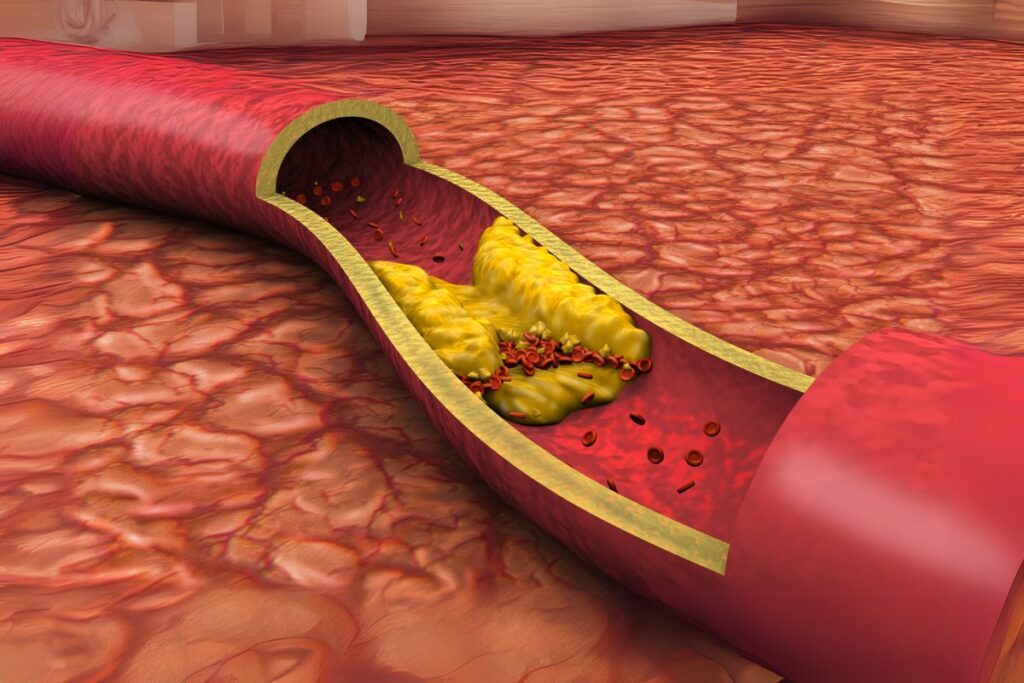Have you been told your cholesterol levels are high but shrugged it off? High cholesterol might not show immediate symptoms, but it silently increases your risk of heart disease and stroke. If you want to avoid a serious heart condition in the near future, you need to take cholesterol seriously. Let’s dive into the truth about cholesterol, its effect on heart health, and how you can manage it to protect your heart.
What is cholesterol, and Why Does It Matter?
Cholesterol is a fatty substance found in every cell of your body, and it’s essential for creating certain hormones, vitamin D, and bile acids. An excessive amount of cholesterol can cause atherosclerosis or hardening of the arteries, which boosts your risk of heart disease and stroke. Cholesterol is carried through your bloodstream by two types of lipoproteins: LDL (low-density lipoprotein), also known as “bad” cholesterol, and HDL (high-density lipoprotein), or “good” cholesterol. Plaque accumulation in your arteries is the result of having high levels of LDL cholesterol.
Symptoms of high cholesterol:
High cholesterol is commonly called “silent killer” because it typically shows no symptoms. A blood test is the best method to find out whether you have high cholesterol. High cholesterol can cause serious heart problems, such as heart attacks and strokes, if it is not controlled.
Busting Common Myths About Cholesterol
Myth 1: “Cholesterol Is Only a Problem for Older Adults”
Reality: High cholesterol can affect people of all ages. Genetics, poor diet, lack of exercise, and certain health conditions can increase cholesterol levels in young adults. The sooner you start managing cholesterol, the better your heart health will be in the long term.
Myth 2: “Eating Fatty Foods Always Raises cholesterol.”
Reality: While saturated fats and trans fats can raise your LDL cholesterol, not all fats are bad for you. In fact, you can improve your cholesterol by consuming healthy fats from foods like avocados, olive oil, and fatty fish.
Myth 3: “Cholesterol Medications Are Dangerous”
Reality: When taken as instructed, statins and other medications that reduce cholesterol are usually safe. By decreasing LDL cholesterol and reducing the chance of plaque buildup, they help prevent heart disease. To find out the best plan of action for you, always speak with your doctor.
Treatment Options for High Cholesterol
Your doctor might suggest PCSK9 inhibitors, ezetimibe, or statins to help lower your LDL cholesterol if your levels are high. By stopping plaque buildup, these medicines lower the risk of heart attacks and strokes. Your doctor will ask you to change the way of living your lifestyle, such as eating a heart-healthy diet, getting more exercise, and keeping a healthy weight, in addition to medication.
Preventing High Cholesterol: Steps You Can Take
The good news is that maintaining a diet that has an abundance of fruits, vegetables, and whole grains may shield you from heart problems. Absorbing fewer saturated fats and trans fats will assist in cholesterol control. Cycling and brisk walking are examples of exercise that are beneficial to your cardiovascular health, specifically by raising your HDL cholesterol levels. It will also be good for your heart if you limit heavy alcoholism and refrain from smoking. Regular medical check-ups are necessary to monitor cholesterol levels, especially if you have a family history of heart diseases that are associated with high cholesterol.
Frequently Asked Questions (FAQ)
What is a healthy cholesterol level?
A total cholesterol level of less than 200 mg/dL is considered healthy, with an LDL level under 100 mg/dL being ideal.
How can I lower my cholesterol naturally?
Eating a diet that has loads of fiber, healthy fats, and antioxidants, along with regular exercise, can help lower cholesterol levels naturally.
Can I stop taking cholesterol medication once my levels are normal?
It’s important to follow your doctor’s advice. If you have made adjustments in your way of living along with taking medicines, and that has been fruitful in lowering your cholesterol levels, then your doctor might ask you to continue doing it to maintain your heart health.
How HealthPil Can Help:
If you’ve been diagnosed with high cholesterol or are concerned about your heart health, HealthPil can connect you with expert cardiologists who can help guide you through treatment options. Our platform offers a convenient way to consult with professionals who will tailor a plan to your specific health needs, helping you manage cholesterol and protect your heart.
Disclaimer:
This article provides general information and is not a substitute for professional medical advice. Always consult your healthcare provider for advice regarding cholesterol management and heart health.

